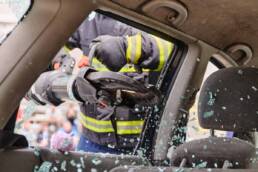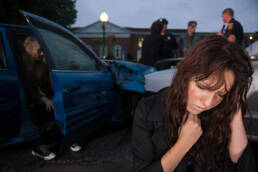Car accidents can cause a wide range of injuries, from minor to severe. Prompt diagnosis and treatment are crucial to recovery. Below, we explore the most common injuries and their signs, symptoms, and treatments to help you better understand what to expect after a collision.
1. Whiplash
Cause: Whiplash occurs when the neck is suddenly jerked backward and forward, often during rear-end collisions.
Signs/Symptoms:
- Neck pain and stiffness
- Headaches (especially at the base of the skull)
- Shoulder pain
- Dizziness or vertigo
- Numbness or tingling in the arms
- Limited range of motion in the neck
Treatment:
- Pain relievers (ibuprofen, acetaminophen)
- Ice or heat therapy
- Chiropractic treatments and physical therapy to improve range of motion
- Neck brace (in some cases)
- Rest and gentle movement exercises as directed by a doctor
2. Concussion (Mild Traumatic Brain Injury)
Cause: A blow to the head or violent shaking during a collision can result in a concussion.
Signs/Symptoms:
- Headache or dizziness
- Confusion or memory problems
- Nausea or vomiting
- Sensitivity to light or noise
- Fatigue or sleep disturbances
- Difficulty concentrating
- Loss of consciousness (in severe cases)
Treatment:
- Rest and avoid physical or mental exertion
- Gradual return to normal activities as symptoms improve
- Pain management with over-the-counter medications
- In some cases, cognitive therapy or other interventions may be recommended
3. Fractures (Broken Bones)
Cause: The force of the collision can cause bones to break, especially in areas such as the arms, legs, ribs, and pelvis.
Signs/Symptoms:
- Swelling or bruising at the injury site
- Severe pain, especially when moving or touching the affected area
- Deformity or misalignment of the limb
- Inability to move or bear weight on the affected body part
Treatment:
- Immobilization using splints or casts
- Pain relief with medications
- Surgery may be required in severe fractures
- Physical therapy to regain strength and mobility post-healing
4. Spinal Cord Injuries
Cause: High-impact collisions or sudden movements can damage the spine, leading to injuries ranging from mild to severe, including paralysis.
Signs/Symptoms:
- Severe back pain or pressure
- Numbness or tingling in the limbs
- Loss of movement or weakness in limbs
- Difficulty breathing (if the injury is at a high level of the spine)
Treatment:
- Immediate immobilization (using a neck brace or backboard)
- Surgery to stabilize the spine and prevent further injury
- Rehabilitation to regain function, including physical therapy and assistive devices
- Ongoing support for recovery, including pain management
5. Internal Injuries (e.g., Organ Damage, Internal Bleeding)
Cause: Blunt force trauma or penetrating injuries during a car accident can cause internal bleeding or damage to organs like the liver, spleen, or lungs.
Signs/Symptoms:
- Abdominal pain or tenderness
- Blood in urine or stool
- Difficulty breathing or shallow breathing
- Low blood pressure, dizziness, or fainting (signs of shock)
- Nausea and vomiting
- Bruising or swelling in the abdomen
Treatment:
- Emergency medical attention is required
- Surgical intervention to repair damaged organs or stop internal bleeding
- Blood transfusions may be necessary in cases of severe blood loss
- Close monitoring in a hospital setting for complications
6. Soft Tissue Injuries (Sprains, Strains, Bruises)
Cause: The forces involved in a crash can stretch or tear muscles, ligaments, or tendons.
Signs/Symptoms:
- Pain, swelling, or tenderness in muscles, ligaments, or tendons
- Bruising or discoloration
- Limited range of motion or difficulty using the affected body part
Treatment:
- Rest, ice, compression, and elevation (R.I.C.E.)
- Over-the-counter pain relievers (ibuprofen, acetaminophen)
- Physical therapy for rehabilitation
- In severe cases, a brace or sling may be needed to immobilize the injured area
7. Chest Injuries (e.g., Rib Fractures, Pneumothorax)
Cause: The chest area can be impacted by the steering wheel, airbag, or seatbelt during an accident.
Signs/Symptoms:
- Sharp pain when breathing or coughing
- Difficulty breathing
- Visible bruising or swelling on the chest
- Shortness of breath, especially after a significant impact
Treatment:
- Pain management (typically with medications)
- Rib fractures may require supportive care and rest
- Pneumothorax (collapsed lung) may require chest tube insertion
- Monitoring for complications such as respiratory distress
8. Psychological Injuries (Post-Traumatic Stress Disorder or PTSD)
Cause: Car accidents can be traumatic, leading to psychological and emotional stress.
Signs/Symptoms:
- Flashbacks or nightmares about the accident
- Anxiety or panic attacks
- Difficulty sleeping
- Emotional numbness or avoidance of reminders of the accident
- Increased irritability or anger
Treatment:
- Counseling or psychotherapy (e.g., cognitive-behavioral therapy)
- Medication for anxiety or depression
- Relaxation techniques (e.g., meditation, deep breathing exercises)
- Support groups for individuals dealing with trauma
9. Knee or Leg Injuries
Cause: During a car accident, knees or legs can be injured due to the impact with the dashboard or steering column.
Signs/Symptoms:
- Pain, swelling, or bruising around the knee or leg
- Difficulty moving or putting weight on the leg
- Instability in the knee joint or limping
Treatment:
- Ice and compression for initial relief
- Rest and elevation of the affected leg
- Physical therapy after the injury heals
- Surgery for torn ligaments or fractures
Immediate Steps Following a Car Accident
- Seek Medical Attention: Even if you feel fine, some injuries may not show symptoms right away.
- Take Notes on Your Symptoms: This will help doctors in diagnosing any injuries and understanding their severity.
- Follow the Doctor’s Recommendations: Adhering to prescribed treatments, such as physical therapy or medications, is crucial for full recovery.
- Rest and Avoid Aggravating Activities: Avoid activities that may worsen your injury until you’re cleared by a healthcare professional.
Conclusion
Car accident injuries can vary in severity, and prompt medical attention is essential for proper diagnosis and treatment. Always seek immediate care if you’re involved in a crash, even if injuries are not immediately noticeable, as some can manifest later.
If you’ve been injured in a car accident, call Denver South Chiropractic today. Our whiplash injury specialists are here to help you heal and recover from pain.
Denver South Chiropractic
Discover comprehensive chiropractic care in Denver with Dr. Hitender at Denver South Chiropractic. From pain relief to injury recovery, Dr. Hitender offers tailored treatments for optimal health and wellness. Book your consultation today.
Like this article? Spread the word!
Related Posts
May 15, 2025
The Importance of Seeing a Chiropractor After a Car Accident
Looking for a chiropractor after a car accident? Denver South Chiropractic & Rehab is the…
February 18, 2025
Auto Accident Injury Treatment at Denver South Chiropractic & Rehab: Your Road to Recovery
Recover from auto accident injuries with expert chiropractic care at Denver South…
October 4, 2024
Auto Accident Injury Treatment and Care: Denver South Chiropractic & Rehab’s Guide for the Denver Metro Area
Recover from auto accident injuries with expert chiropractic care at Denver South…




